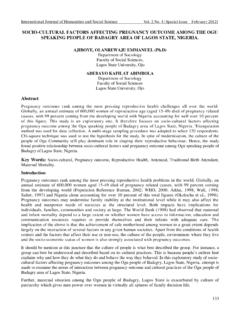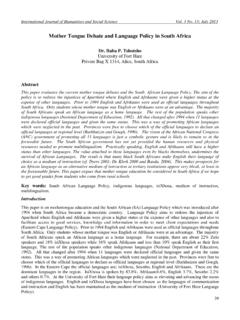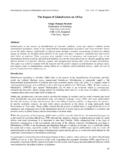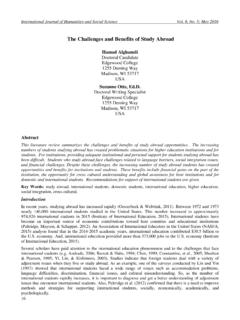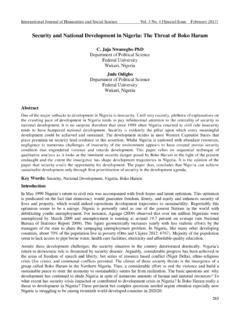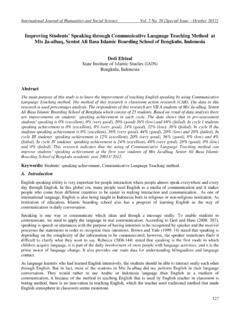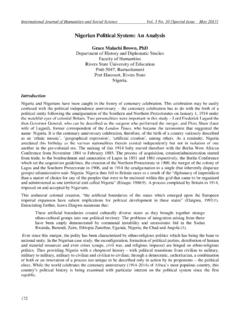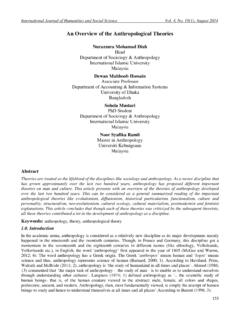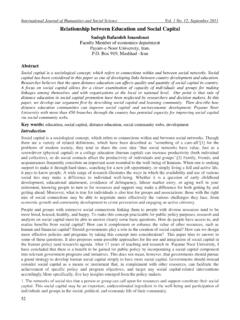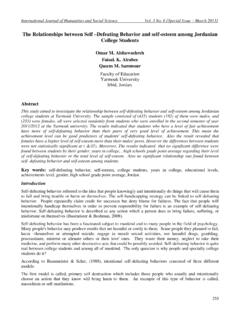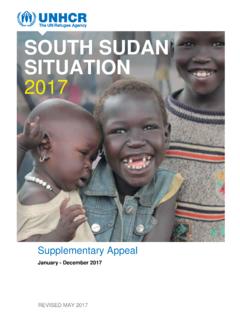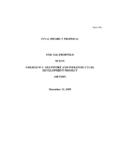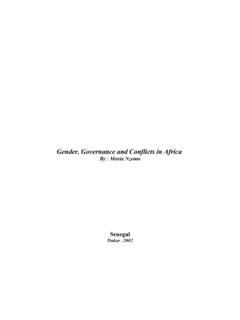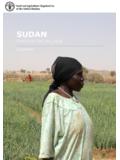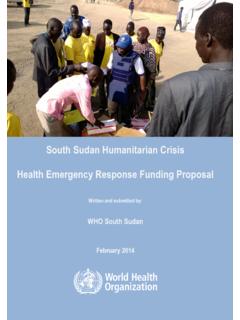Transcription of The Role of African Traditional Religion, Culture …
1 International Journal of Humanities and Social Science Vol. 2 No. 21; November 2012 49 The Role of African Traditional religion , Culture and World-View in the Context of Post-War Healing among the Dinka Community of Southern Sudan Alex Kamwaria Department of Philosophy and Religious Studies Kenyatta University Box 43844 00100 Nairobi Kenya Michael Katola Department of Philosophy and Religious Studies Kenyatta University Box 43844 00100 Nairobi Kenya Abstract This article explores how the Dinka concept of health and illness is filtered and interpreted through religion , Culture and world-view.
2 Health and illness have a broader dimension that includes the religious, cultural, and ecological components. The Dinka community has many rituals directed at ensuring good health, preventing danger to health, curing afflictions, removing impurities in people and homesteads, and protecting people, their animals and crops. Health and illness are not just physical conditions, but are also linked to the beliefs and practices of the Dinka Traditional religion . They are religio-cultural matters which have to be dealt with in religio-cultural ways.
3 Key words: African Traditional religion , Rituals, World-view, Healing, Post-war healing 1. Introduction The article is based on a research project carried out in partial fulfillment of the requirements for award of doctoral degree. The study was carried out in the Southern Sudan between November 2009 and March 2010 in some of the areas occupied by the Dinka community. Among other objectives, the research aimed at the finding out the notions of health and illness in the religio-cultural context of the Dinka community.
4 It further sought to identify the Traditional concepts, beliefs, and practices related to health that can be revitalized and integrated into post-war healing approaches for the victims of the civil war. Notably, this article is only an excerpt of the findings. The article underlines that the Dinka concepts of health and illness are filtered and interpreted by their Traditional religion and world-view. It explains that health and illness are approached in terms of life rather than bodily process.
5 For that reason, health and illness have a broader dimension that includes the religious, cultural, and ecological components. The Traditional religion supports various ways of preserving health and dealing with illnesses and affliction through rituals. In the ritual processes and procedures, cattle serve as surrogates for human beings. They are agents by which members of the Dinka community enter into communion with the transcendental and mundane realities. Background and Problem of the Civil War in Southern Sudan Southern Sudan witnessed two main civil wars between the Arab-led government of Khartoum and the Sudanese People s Liberation Movement/Army (SPLM/A).
6 The first civil war was from 1956 to 1972; the second was from 1983 to 2005. After several peace initiatives, the antagonists eventually reached a comprehensive peace agreement, which was endorsed in Nairobi on January 7, 2005. Centre for Promoting Ideas, USA 50 This ended the Africa s longest-running and deadliest war and further saw many refugees and asylum seekers return to their motherland. The return to motherland took a long time, given the adverse effects of war on resources and infrastructure.
7 The scale and duration of the war has engendered massive health complications in the form of physical, social and emotional problems. In addition to losing their loved ones through death, many victims are still nursing the physical and psychic injuries. Others continue living in squalor, hunger, and dire poverty. Special attention needs to be given to the victims of civil war, so that they may resume normal and productive life. The Dinka community, which was much affected by the civil war, has to be assisted to regain its own social balance and harmony.
8 Therefore, healing of afflictions and cleansing of evils caused by the civil war is imperative if peaceful and harmonious co-existence is to continue in the community. It is in this regard that this research was undertaken to find out the appropriate means of healing the war affected victims in the Dinka community. Data Collection Methods Data was obtained from primary and secondary sources. Three types of research design, namely, explorative, survey and descriptive were used to enhance data collection.
9 Explorative design was utilized in the identifying the problem and review of related literature. Survey design was used in the formulation of research instruments and determining the sample size and categories for interviews. Descriptive design was used in the interpretative qualitative methods that were used to provide a rich and textured view of the issues as they presented by respondents. Extensive field visits were undertaken, whereby semi-structured and structured interviews were conducted with the members of the Dinka community.
10 Structured interviews were also conducted on key informants such as the indigenous ritual experts, ex-combatants, and victims of the civil war. In-depth interviews were also conducted with the key informants whose views and perceptions on the post-war healing rituals were solicited. 2. Who are the Dinka? The Dinka people designate themselves, Monyjien or Jien, meaning People of the people. Scholars like Lienhardt (1961) and Deng (1972, 1980) agree that this is the strongest term existing in their language.
